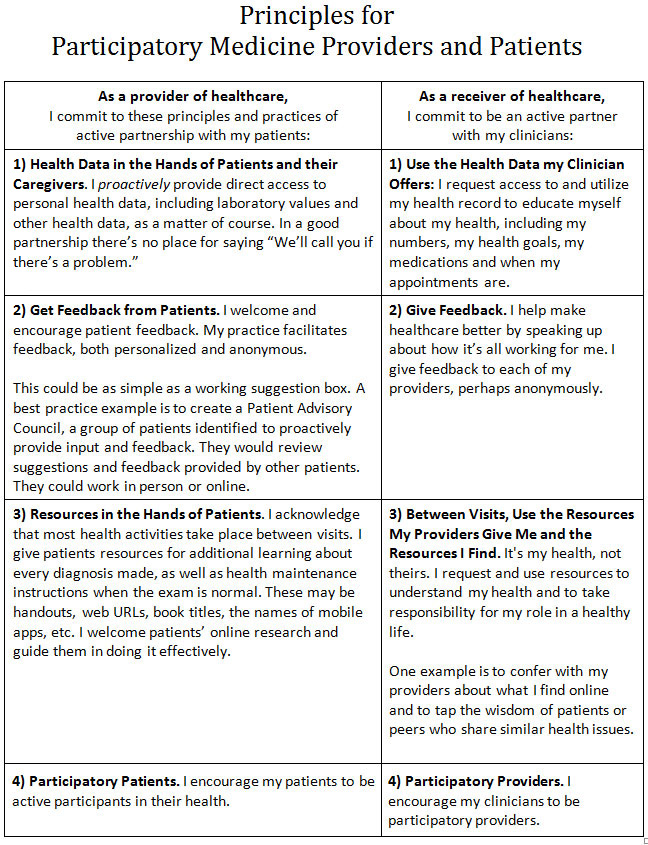At Health Datapalooza today in Washington, DC, the Society for Participatory Medicine announced the live beta launch of our Seal Program. The SPM Seal will be awarded to clinicians and to patients who make four simple, achievable, but powerful participatory commitments. Clinicians also agree to allow patients to verify that they are keeping those commitments. Their seal will not go live unless they have been nominated or verified by at least one patient.
This gives us a growing, searchable database which people and services can use to identify participatory providers and patients. Beyond this, the commitments teach core participatory principles as well as raise the bar. Each of the four commitments expands participation and has power to instigate change.
Clinicians are also encouraged to take the Participatory Patient pledge for themselves.
Meanwhile, we’ll be collecting individual stories of participation to display on the Seal website.
The SPM Seal dovetails nicely with the ONC and their pledge program for organizations, with our live beta announcement occurring in their consumer session at HDI.
Come to seal.participatorymedicine.org to nominate clinicians, to take the participatory provider and/or patient pledge, to search for those who have, to validate clinicians, or to submit participatory stories.
This fall, after we’ve had a chance to learn from the beta, we’ll roll out the Society for Participatory Medicine Seal Program in a big way. Participatory Medicine is Better Medicine, and it’s time to put in on the map.
Special thanks to Indu Subaiya, Elise Singer, Alan Viars, Fred Trotter, Carole Peckham, John Grohol, Richard Sachs, Cheryl Greene, and Deb Linton, who have all worked on this project directly, as well as to the Society’s Exec Team that wrestled with issues surrounding the Seal at many Exec meetings, and to the many others who have given input along the way.







I am excited to see this group putting together a plan that is a going to promote the patient-centered model for health care. I am writing a book and have similar ideas that I have included to reflect this. I took my inspiration to write my book because I finally found doctors who listened to me and on this basis changed my health care management. I have included and developed my format and content on the many ideas arising out of the discussions from the S4PM and many other websites. Thank you for creating this avenue for discussion.
Liz Rankin BScN
So, Liz, have you joined the Society?? http://www.participatorymedicine.org/join-us It’s only $30/year for an individual – maybe you should join this team!
I find this to be a very interesting initiative. However, just to be sure I understand correctly, this is something that is limited to the U.S.A., correct?
I am a French Canadian patient (Kidney cancer, Stade IV, Grade IV, diagnosed in 2006), living in Montreal, Canada. I joined the Society a few weeks ago, just as I joined some organizations here in Canada, as well as in France. Comparing the actions of patient groups, the relationships between patients and doctors, as well as policies and trends, is providing interesting insights in healthcare as a whole, under very different healthcare systems, and in the role of patients in their healthcare.
Is the SFPM thinking of expanding its advocacy and/or programs – like the Seal Program – outside the United States? While some issues discussed may be very country-specific, programs like this one are relevant in any country.
Although data is important most of us who have been working in patient centered care for a few years now believe that the real change is in the role of the patient from one of recipient of data to an active member of their own care team.
Many of the above goals are “from” and “to” vs with and between. Hopefully as we move forward we will learn from the Beta and find ways to position the patient and their family as integral stakeholders and full members of their care teams and the health care system.